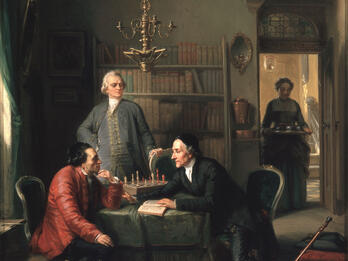Naphtali Herts Wessely
Born in Hamburg and raised in Copenhagen, Naphtali Herts Wessely was a pioneering Haskalah figure and a contemporary of Moses Mendelssohn. He studied religious subjects under Jonathan Eybeschütz, but also studied modern languages and eventually became a poet and linguist, exploring biblical Hebrew and writing biblical commentaries. Wessely urged a complete change of attitude toward non-Jews. He was a practicing Jew whose significance lay in his call to reimagine Ashkenazi Jewish society and culture from the top down. His epistle was a gauntlet thrown down to traditional rabbinic authority and was widely seen as the text that crystallized the aims of the Haskalah (Jewish Enlightenment) movement. As a representative of the Feitel Bank, Wessely moved to Berlin, where he met Mendelssohn. He strongly advocated for the social and educational reforms laid out in Joseph II of Austria’s Edict of Toleration, writing Divre shalom ve-emet (1782) to advocate for Jews in German-speaking lands to accept these reforms.


